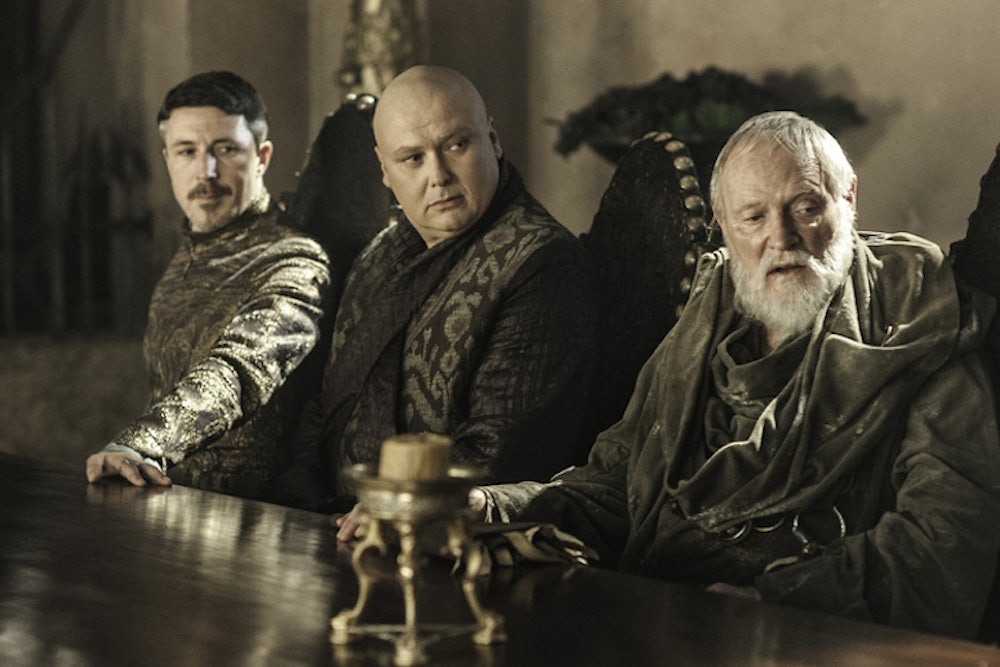The most important moment of this week’s episode was rather quietly tucked in among some passionate (if revolting) kisses between the series’ most unlikely couple to date. Littlefinger, returning to the Eyrie with Sansa in tow, was greeted by a cloying, needy—and libidinous—Lysa Arryn. And while their engagement was long-known, their (clearly one-sided) romantic history was not. Once left alone, Lysa’s lips became loosened in more ways than one. Keen to remind her future husband of her devotion, Lysa offered Littlefinger a laundry list of all the indiscretions she’s committed for him, and revealed to all of us that she, at his bidding, is the little lady who started this great war.
“You gave me those drops and told me to pour them into Jon’s wine,” she blurted out, confessing that it was she who killed her husband, Robert Baratheon's original Hand of the King. “You told me to write to a letter to Cat, tell her that it was the Lannisters who…,” she added, confirming that she stoked the flames of discord between the Starks and the Lannisters. Which leads to the rather marvelous, and game-changing, revelation that Littlefinger has singlehandedly masterminded the events that led to Ned Stark’s death, the War of the Five Kings, and the near ruin of Westeros, not to mention Joffrey’s assassination and the kingdom’s inattention to the quite serious wildling/white walker problem. In short, he’s been behind nearly every major power shift throughout the entire series.
Warning: Here lie millions of spoilers.
But why? Last week, when confronted about Joffrey's murder, Littlefinger offered Sansa the rather unsatisfactory answer that he just likes to keep his enemies on their toes. That, for no apparent reason, he had arranged for Joffrey’s murder so that he might sow unexpected discord among the kingdom’s power players, thus weakening them all while he sailed off unsuspected. But that explanation barely held water with Sansa (who is, let’s be honest, not the quickest). So to now discover that he’s been carrying on an illicit affair with a woman he obviously doesn’t love so that he might manipulate her into murder and mayhem requires a bit more creativity about his motivations.
One thing is clear, and that’s what Littlefinger stands to gain from marrying Lysa—and it isn’t marital bliss. The Vale has the largest intact army in all of Westeros; Lysa’s refusal to engage in the War of Five Kings means that her stockpile of gold and men stands undepleted. Furthermore, as Littlefinger explains to Sansa on their approach to the Eyrie, the castle is virtually impregnable—the fortress in the sky has never once been breached in battle.
What’s more, Tywin's confession to Cersei that the Lannisters and the crown are majorly in debt takes on special significance when considered in conjunction with Littlefinger’s departure. As the former Master of Coin, it was always apparent that Littlefinger skimmed off the top to finance his brothels and other businesses. But now, Tyrion’s griping about Littlefinger’s unbalanced, chaotic, and downright smudged accounting, coupled with Tywin's revelation, makes it apparent that the crown's funds have most likely been diverted to Littlefinger's pockets. Even with the largest army in the kingdom and impenetrable fortress, Littlefinger would need gold to wage—and win—a war.
So if you combine the fortress, the army, the money, the wealth of information, and the fact that he's entirely unsuspected of any serious wrongdoing? You have Lord Petyr Baelish, most powerful man in Westeros, who is probably about to get much more powerful.
Littlefinger played the contented, reactive yes-man well enough to fool two kings and probably most viewers. While it’s always been clear that, like Varys, Littlefinger sought to enhance his pot of gold and his stockpile of secrets, he often seemed more profiteer than mutineer. But now we know that Littlefinger is playing a long game—one he started years ago, and obviously plans on playing years into the future. Which brings us to two competing theories of what exactly Littlefinger wants: the crown itself, or the kind of continuous upheaval across Westeros that will allow him to keep playing puppeteer?
